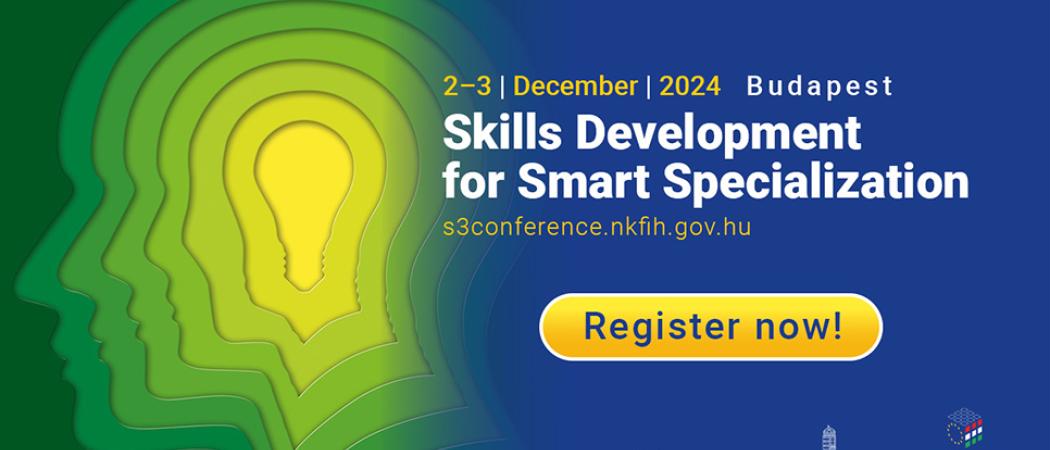An EU conference in Budapest will explore the vital role education and training play in achieving smart specialisation strategies

Europe’s ability to become a driving force in groundbreaking technology and research could hinge on strengthening the link between education and skills training and regional development strategies.
This dynamic will be among the issues considered during the Skills Development for Smart Specialisation Conference taking place on 2-3 December in Budapest, organised by Hungary’s National Research Development and Innovation Office (NRDIO) and funded by the European Commission under the Horizon Europe programme. It is one in a series of events taking place under Hungary’s EU presidency that are aimed at strengthening European competitiveness and regional cohesion.
“Smart specialisation is a very important methodology to maximise regional economic development and is especially relevant now because of the need to increase European competitiveness, which, of course, is linked to improving skills,” said Richard Tuffs, a member of a Brussels-based Friends of Smart Specialisation policy group who will participate in a panel discussion on the EU’s smart specialisation strategy (S3) implementation. Tuffs noted that the skills conference is taking place at a time of extensive debate about cohesion and the role that Europe’s regions can play in spearheading innovation and development. “Hopefully, this conference will help develop potential policy instruments that are needed for the future.”
The European Commission first urged member states to develop S3 plans in 2010 to spur economic and regional growth as well as underpin digital and green transitions. But with many employers struggling with tight skilled labour markets and competition from abroad for workers with advanced research and technology know-how, there is growing recognition that education and training are fundamental to achieving Europe’s S3 ambitions.
In its priority-setting New European Competitiveness Deal, a roadmap for the current EU presidency, Hungary has called for stronger cooperation between educators, training institutions and employers to spur job growth and development. This was echoed by EU leaders meeting in Budapest on 8 November, whose concluding statement underscored the urgency of “harnessing Europe’s talent and investing in skills to foster high-quality jobs throughout the Union”.
The need for long-term thinking
Recent independent reports prepared for the Commission — including the Future of European Competitiveness strategy drafted by Mario Draghi, former European Central Bank President — have highlighted the looming risks associated with shortages of qualified employees at home and the emigration of talented workers to more agile global competitors. Demographic data also suggest even bigger challenges ahead: between 2003 and 2023, the bloc’s overall elderly population grew, while the number of Europeans below age 15 shrank, despite a significant EU expansion.
Tuffs, a former director of the European Regions for Research and Innovation Network (ERRIN), believes the Budapest event provides a platform for understanding the interplay between skills needs and S3 initiatives. For instance, he sees little advantage in developing a strategy for a region when the skills to implement it are not available. To be smart, strategies must also be driven by longer-term thinking. “We need to think about future skills — not what we need now, but if we are to transform the economy, what are the future skills you need,” he explained.
Perhaps equally important is designing a strategy that is actually used. “Regional governments have often written smart specialisation strategies, but then put them on a shelf and rarely refer to or communicate them,” Tuffs noted. “We need to develop better smart specialisation strategies, but just as importantly, we need to put more work into implementing them.”
Assessing S3 past and present
With an eye on addressing the challenges, as well as opportunities, the Skills Development for Smart Specialisation Conference will open with a high-level discussion led by the European Commission’s Andriana Sukova, deputy director-general for employment, social affairs and inclusion. Representatives of the previous two EU presidencies, Belgium and Spain, will share their experiences with S3 strategies to support research and innovation.
The session will be followed by remarks from John Edwards, secretary-general of the European Association of Institutions in Higher Education (EURASHE), and Pirita Vuorinen, a human capital development expert at the European Training Foundation (ETA). They will offer perspectives on the importance of vocational education and training as well as methodological approaches to help educators and training facilities respond to current needs.
Also on the first day, expert panels will explore in detail labour supply challenges and how skills development can support the growth of small and medium enterprises.
On 3 December, conference panels will draw on the experience and expertise of the EU regions in understanding the inter-dependence between economic growth, innovation and skills — and their contributions to the digital evolution and the green transition. Another panel will focus on how skills can be transferred to the increasingly competitive space sector.
The gathering comes on the heels of the Week of Innovative Regions in Europe (WIRE) Conference, which focused on ways to enhance research collaboration to drive innovation across EU regions.




 A unique international forum for public research organisations and companies to connect their external engagement with strategic interests around their R&D system.
A unique international forum for public research organisations and companies to connect their external engagement with strategic interests around their R&D system.